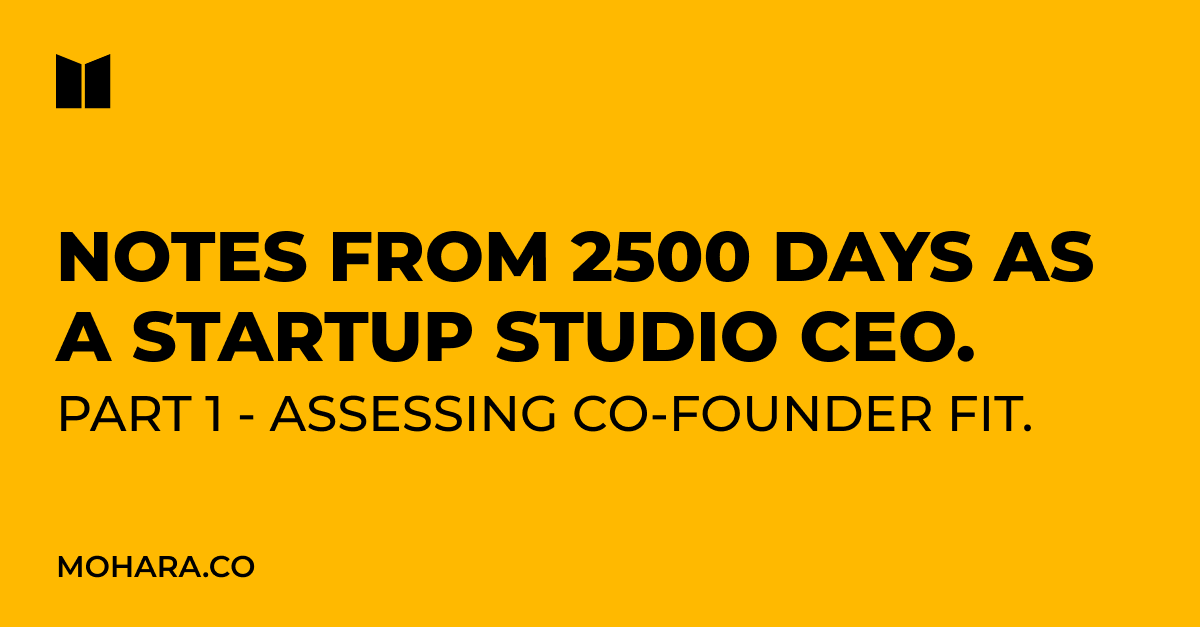Part 1 – Assessing Co-Founder fit
This series will draw on experiences, learnings and thoughts from founding and running a Startup Studio over the past 2500 days. Welcome to part one of six.
Over the 2500 days I have had the pleasure (mostly) of working with over 75 founders, invested in 35 of them and collectively built north of 90 products in their companies. One of the most critical differences I’ve seen between successes and failures comes down to what’s inside the founding team.
I am going to presume for the purpose of part one that all founders understand their ‘why’ for taking the big bold leap and founding a business. I am also writing from a standpoint where a founder has found a potential co-founder or a co-founding team is already together.
Last week I caught up with Csaba Toth. He’s become a good friend and is the founder of one of our first portfolio investments, ICQ Global. We discussed how founders focus almost entirely on the idea; their vision of a solution. They have great excitement about the opportunity and product, but rarely focus on who they need to help them to reach their goals.
In many ways this makes a lot of sense. There’s no product, validated market fit or business yet, so it feels too early to think about a team.
Hiring your early team members is a hugely important time for any startup and getting it right can transform a business and getting it wrong can be utterly destructive.
But what about before the product, before market fit and before the fundraise? The most important ‘hiring’ you will do in the early years of your business is finding your founding team.
Co-Founder fit is critical
What is not often recognised by founders is that there are a few critical stages right at the beginning, before the product, before market fit and before the fundraise.
The most important ‘hiring’ you will do in the early years of your business is that of your founding team.
Prior to founding MOHARA in 2016, my web design and development agency worked with a number of early stage founders seeking the development of an MVP.
Sadly, the vast majority of the startups that we worked with had fellow co-founders at the formation of their companies who were no longer in the business, not contributing to the business or were unhappy in the role they were playing in the business. This created huge issues including immense resentment within the co-founding team and early investors backing off from complicated, misrepresented cap tables..
People are unique and wonderful beings. Within that difference there is as much opportunity for danger as there is opportunity for brilliance and ‘secret sauce’. So it’s vital to do your very best to understand your cofounder. To truly understand them, assess them and be honest.
Things to think about seriously when building relationships with your potential co-founders:
- Be clear with your individual roles and responsibilities
- Be honest about the time you can give and ask for that honesty from others
- Be open about your weaknesses. Don’t just sell your strengths
- Identify gaps in your skill sets or knowledge as a team and try to remove any assumptions
- Discuss your individual visions for the kind of company you want to build. The vision will unlikely be identical and it is essential to understand how they differ
- Discuss your personal values and get to know your co-founder as a human being
- Discuss the values you want your company to have
- Hold yourself and each other accountable
- Take your time – have a few dates before you get married. I.e. Are there ways you can test the relationship before committing to the long haul of building a company?
Final thoughts
I recognise that early stage startups do not always have the luxury of finding the perfect co-founder, it is about finding good co-founder fit. Understanding the shortcomings, the potential pitfalls and being open and honest to try and tackle them ahead of time before you invest countless hours into the business and relationship to have it fall.











